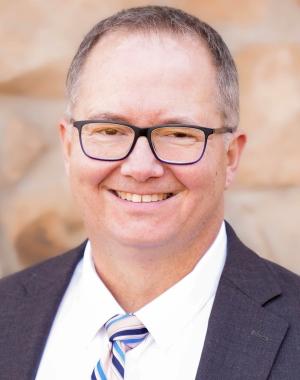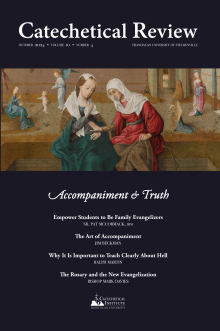 Conversation abounds among Catholic leaders today around the concept of pastoral accompaniment. During this month of October, the participants in the Synod on Synodality continue to discuss what it means to be a listening, synodal Church. Inside and outside the synodal context, many have argued that the Church needs to take a much more “pastoral” stance toward people. Often, however, what they mean is that the clear and unambiguous proclamation of truth must not be as central to the Church’s mission as it once was. Rather, it’s argued, the Church must become more adept at listening, at dialoguing, at seeking to better understand.
Conversation abounds among Catholic leaders today around the concept of pastoral accompaniment. During this month of October, the participants in the Synod on Synodality continue to discuss what it means to be a listening, synodal Church. Inside and outside the synodal context, many have argued that the Church needs to take a much more “pastoral” stance toward people. Often, however, what they mean is that the clear and unambiguous proclamation of truth must not be as central to the Church’s mission as it once was. Rather, it’s argued, the Church must become more adept at listening, at dialoguing, at seeking to better understand.
It is true that personal accompaniment is necessary for Catholic evangelization and catechesis today. Effective evangelists know this. Indeed, magisterial teaching has proposed accompaniment for decades. The 1997 General Directory for Catechesis described “slow stages” of evangelization and insightfully points out that “dialog and presence in charity” must precede “the proclamation of the Gospel and the call to conversion.”[1] That is, before we proclaim Christ and call someone to change, if we wish to do so fruitfully, we will respectfully listen and come to know the person before us, remaining present in charity—no matter what. Such empathy and respect is due to every person. It is, in fact, an essential ingredient for anyone to freely become open to the Gospel and the challenging call to conversion—to change how one sees and lives. The 2020 directory goes a bit deeper:
The present understanding of the formative dynamics of the person requires that intimate communion with Christ, already indicated in the existing Magisterium as the ultimate end of the catechetical initiative, should not only be identified as a goal but also brought about through a process of accompaniment. In fact, the overall process of internalizing the Gospel involves the whole person in his unique experience of life. Only a catechesis that strives to help each individual to develop his own unique response of faith can reach the specified goal.[2]
Evangelization and catechesis are not merely about content delivery, though the content of Revelation is always central to this mission. Our hope is that a person becomes interiorly responsive to Jesus, choosing to freely step forward toward him. In our current day, such a movement is most likely to happen when a person hears the bold proposal of the Gospel and is also helped by another’s witness and experience to form a personal response.
It is imperative to note, though, that “being pastoral” never involves a diminishment of the demands of the Gospel. Nothing is more pastoral and kind than speaking the truth in love to another person. Christianity is, in its essence, a proposal of the love of God that requires a radical turn, a deep conversion of life. For the Christian, our ways of thinking and living have to become more and more aligned with what Christ has revealed and the grace he has given. In this context, we can see that to merely accompany and not propose conversion to the fullness of life in Christ is not pastoral. It’s neither loving nor kind. And it’s certainly not Christian. Pastoral accompaniment doesn’t mean that the truth of the Gospel should in any way be compromised, weakened, or abandoned. The key is knowing when to listen, when to seek understanding, and when it is important to speak.
The New Testament story most often drawn upon in describing accompaniment is the encounter of the disciples with Jesus on the road to Emmaus (Lk 24:13–35). We know the result of this conversation: their “hearts burn[ed] within” them and they recognized him “in the breaking of the bread” (vv. 32, 35). And then they turned around and went back to the Church that was bursting into life in Jerusalem. Cardinal Timothy Dolan suggests, when considering pastoral accompaniment, that we take in the full Emmaus account, each of the different initiatives the Lord undertook on behalf of these disciples who were leaving the Body of Christ. Cardinal Dolan suggests that our mission today is “to draw near, to accompany, to question, to listen” but also eventually “to rebuke the lack of faith, to teach the truth of the Gospel, to reveal Christ, to restore hope, to convert, to return to the Church.”[3] These are the various facets of how Jesus pastored those who were leaving the Church, each action undertaken out of profound love.
And so, accompaniment is never an indefinite walking with people as they move more and more deeply away from the Lord. For, as Cardinal Dolan continues, “if we only accompany but do not convert, then we simply walk beside people farther into the night.”[4] It is the catechist’s duty to propose light and truth, always from a place of love, in ways that each person can receive. In short, it is our task not only to walk beside others but also to hold high the lamp and illuminate the way.
Dr. James Pauley is Professor of Theology and Catechetics at Franciscan University of Steubenville and the author of two books focused on the renewal of catechesis. He also serves on the USCCB’s executive team for the Eucharistic Revival.
Notes
[1] Congregation for the Clergy, General Directory for Catechesis (1997), no. 47.
[2] Pontifical Council for the Promotion of the New Evangelization, Directory for Catechesis (Washington, DC: United States Conference of Catholic Bishops, 2020), no. 3 (emphasis original).
[3] Cardinal Timothy Dolan, “Lord, to Whom Shall We Go?: Report on the Synod,” Catholic New York, October 26, 2015.
[4] Dolan, “Report on the Synod.”
This article originally appeared on pages 4-7 of the print edition.
Art Credit: Don Bosco Hears Confessions, Salesiani Don Bosco, Flickr.com.
[1] Congregation for the Clergy, General Directory for Catechesis (1997), no. 47.
[2] Pontifical Council for the Promotion of the New Evangelization, Directory for Catechesis (Washington, DC: United States Conference of Catholic Bishops, 2020), no. 3 (emphasis original).
[3] Cardinal Timothy Dolan, “Lord, to Whom Shall We Go?: Report on the Synod,” Catholic New York, October 26, 2015.
[4] Dolan, “Report on the Synod.”
This article originally appeared on pages 4-7 of the print edition.
Art Credit: Don Bosco Hears Confessions, Salesiani Don Bosco, Flickr.com.
This article is from The Catechetical Review (Online Edition ISSN 2379-6324) and may be copied for catechetical purposes only. It may not be reprinted in another published work without the permission of The Catechetical Review by contacting [email protected]


















